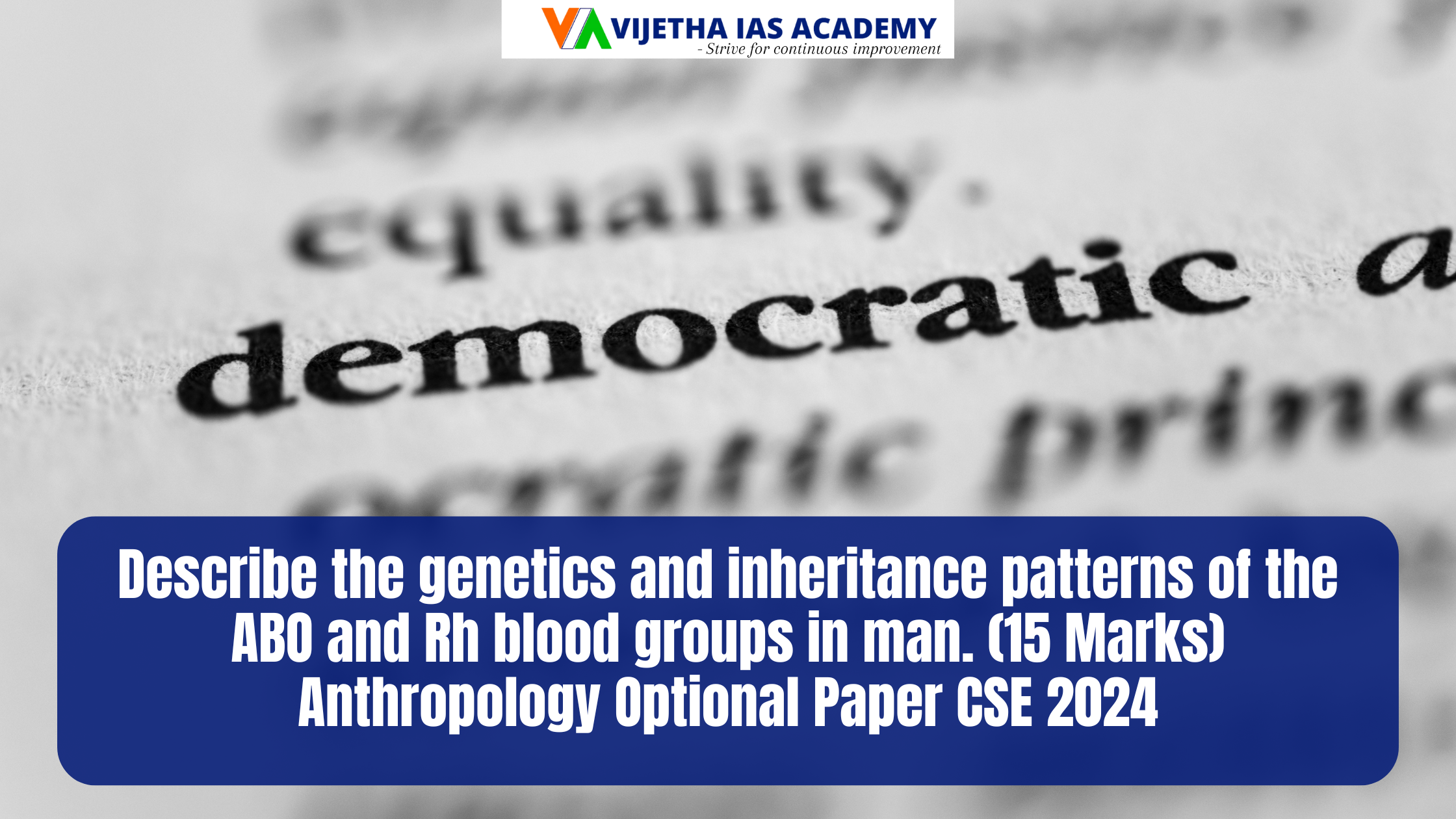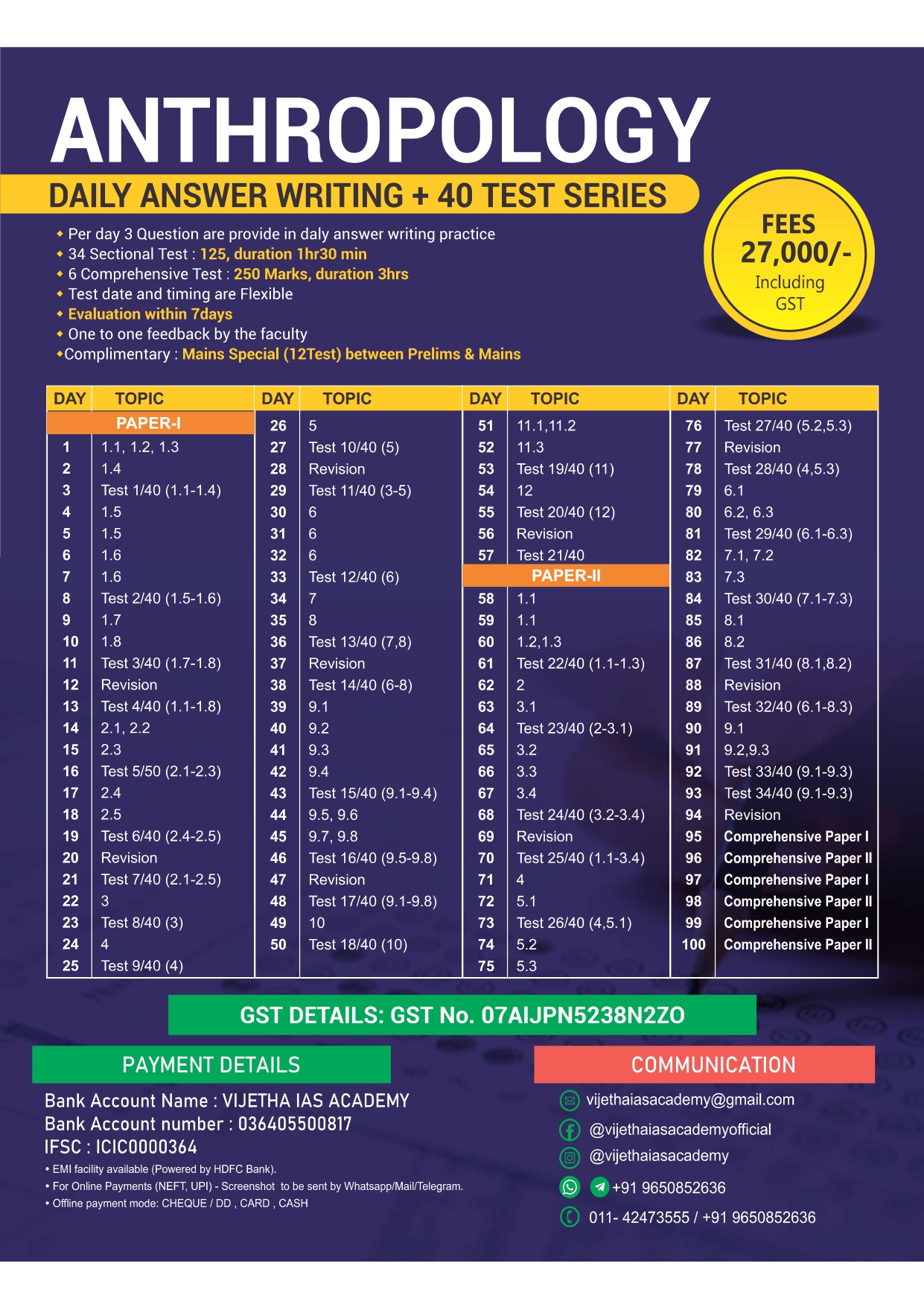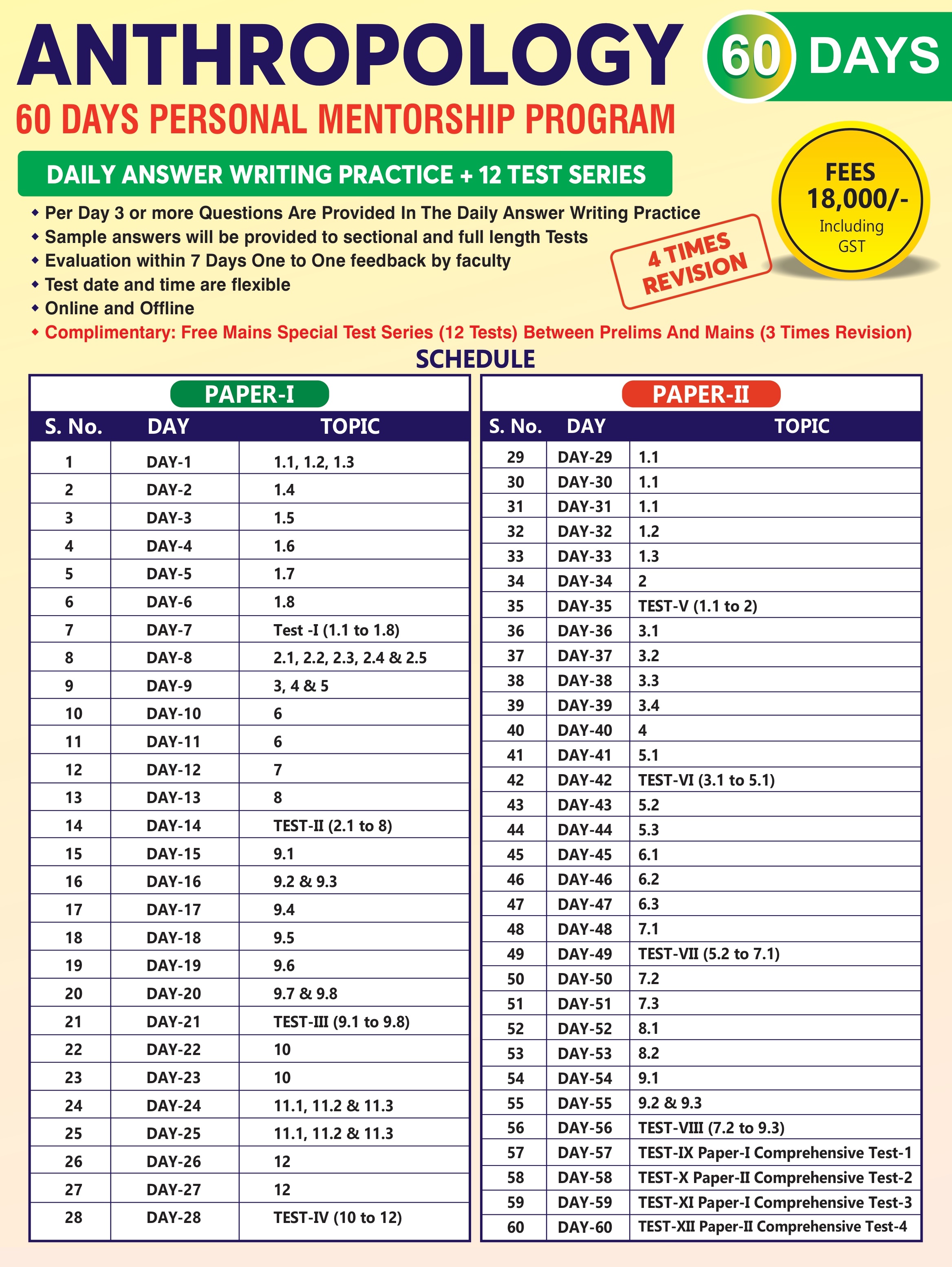
Describe the genetics and inheritance patterns of the ABO and Rh blood groups in man.
(15 Marks) Anthropology Optional Paper CSE 2024
Introduction
The ABO and Rh blood group systems are two of the most important and widely studied genetic markers in humans. These systems play a crucial role in blood transfusions, organ transplantation, and understanding inheritance patterns in human populations. The ABO blood group is determined by the presence or absence of specific antigens on red blood cells, while the Rh factor is determined by the presence of the Rh(D) antigen. The inheritance of these blood groups follows specific Mendelian patterns, with co-dominance and dominant-recessive relationships.
Main Body
ABO Blood Group Genetics:
The ABO blood group system is governed by a single gene located on chromosome 9, known as the ABO gene. This gene has three alleles: A, B, and O. The A and B alleles are co-dominant, while the O allele is recessive. Individuals inherit one allele from each parent, and the combination of these alleles determines their blood type: Type A: Can have either AA or AO genotype. The A allele expresses the A antigen on red blood cells. Type B: Can have either BB or BO genotype. The B allele expresses the B antigen. Type AB: Has the AB genotype. Both A and B antigens are expressed on the red blood cells, making AB an example of co-dominance. Type O: Has the OO genotype. Neither A nor B antigens are present on the red blood cells, as O is recessive. The ABO gene encodes an enzyme that modifies carbohydrate structures on the surface of red blood cells. In individuals with the A allele, the enzyme adds N-acetylgalactosamine to the H antigen, forming the A antigen. In individuals with the B allele, the enzyme adds galactose, forming the B antigen. Those with the O allele produce a non-functional enzyme, leaving the H antigen unmodified, hence no A or B antigens are produced.
Inheritance of the ABO Blood Group:
The ABO blood group follows Mendelian inheritance. If both parents are heterozygous for the A and O alleles (AO), their children can inherit any of the following genotypes: AA, AO, or OO, resulting in either A or O blood type. If one parent has type AB blood and the other has type O blood (OO), the possible genotypes of the offspring will be either AO or BO, resulting in either A or B blood type. For example, if a father with blood type A (AO) and a mother with blood type B (BO) have children, the possible blood types are A (AO), B (BO), AB (AB), or O (OO).
Rh Blood Group Genetics:
The Rh blood group system is primarily determined by the presence or absence of the Rh(D) antigen on red blood cells. The gene responsible for Rh factor is located on chromosome 1 and consists of two alleles: D (dominant) and d (recessive). Individuals with at least one D allele (DD or Dd) express the Rh(D) antigen and are classified as Rh-positive. Those with the dd genotype do not express the antigen and are classified as Rh-negative. Rh inheritance is simpler compared to ABO, as it follows a dominant-recessive pattern. The D allele is dominant, meaning that if a person inherits one D allele from either parent, they will be Rh-positive.
Inheritance of the Rh Factor:
Rh factor inheritance follows the same principles of Mendelian genetics as the ABO system. If one parent is Rh-positive (Dd) and the other is Rh-negative (dd), the offspring can be either Rh-positive (Dd) or Rh-negative (dd), depending on which alleles they inherit. If both parents are Rh-negative (dd), all offspring will also be Rh-negative. Conversely, if both parents are homozygous Rh-positive (DD), all offspring will be Rh-positive. The Rh factor is particularly significant during pregnancy, where an Rh-negative mother carrying an Rh-positive fetus can develop antibodies against the fetal Rh(D) antigen. This condition, known as hemolytic disease of the newborn (HDN), can lead to complications if not managed.
Combination of ABO and Rh Inheritance:
Both ABO and Rh inheritance follow independent genetic patterns, but the combination of the two systems results in eight possible blood types: A+, A-, B+, B-, AB+, AB-, O+, and O-. For instance, an individual with genotype AO for the ABO blood group and Dd for the Rh factor would have an A+ blood type. If they had OO for ABO and dd for Rh, they would have O- blood type. Conclusion The ABO and Rh blood group systems demonstrate two different genetic inheritance patterns—co-dominance for ABO and dominant-recessive inheritance for Rh. These systems are essential for understanding transfusion compatibility, organ donation, and certain genetic diseases. The study of these blood groups provides valuable insight into human genetics, population studies, and the inheritance of complex traits.
Anthropology Test Series Programme (Online + Offline))
We provide Anthropology Daily Answer Writing a range of programs designed to cater to various stages of UPSC preparation. Whether you're just starting out, have attempted the Mains before, or are getting ready for Mains 2024, we have the right option for you. Allow us to assist you in choosing the course that best fits your needs.
|
Level of Preparation |
Test Series Program |
Test Series Content |
Test Schedule |
|
Self-study of Anthropology Optional |
Anthropology 100 Days Personal Mentorship Program |
Daily answer writing, 34 sectional tests, 6 comprehensive tests, and complementary Mains Special 12 tests (between prelims and mains) |
|
|
Revise whole syllabus through Daily Answer Writing Practice and Tests |
Anthropology DAW Mentorship Program |
Daily Answer Writing Practice and 8 sectional and 4 Full Length tests |
|
|
Revise whole syllabus through Sectional and Full Length Tests |
Anthropology Tier- I T-40 Test Series |
34 Sectionals and 6 Full Length Tests |
|
|
Written Mains earlier and need more practice |
16-Anthropology Tier II Test Series |
10 sectional and 6 Full-Length Tests. |
|
|
Cleared Prelims 2023 and are preparing for Mains 2023 |
Mains Special 12 Tests program |
8 Sectional and 4 Full-Length Tests |
ANTHROPOLOGY MAINS SPECIAL COURSES
Enroll in our Anthropology Mentorship Program today and take the first step towards achieving your UPSC goals!
1) If you are going for Self study of Anthropology Optional and looking for a Comprehensive Program that includes Daily Answer Writing, 34 Sectional tests, 6 Comprehensive tests, and Complementary mains special 12 tests (between prelims and mains), our Anthropology 100 Days Personal Mentorship Program is the perfect choice.
2) If you want to revise Whole Syllabus through Daily Answer Writing Practice and 8 sectional and 4 full length tests, then our Anthropology DAW Mentorship Program is the best fit for you.
3) If you want to revise Whole Syllabus through 34 Sectionals and 6 Full Length Tests then Anthropology Tier- I T-40 Test Series is for you.
4) If you have written Mains earlier and need more practice, then our 16-Anthropology Tier II Test Series is a great option. This test series includes 10 sectional and 6 full-length tests.
5) if you have cleared Prelims 2023 and are preparing for Mains 2023,our Mains Special 12 Tests program is a must-have. This program includes 8 sectional and 4 full-length tests to help you prepare for the big day.
For more information on Vijetha IAS Academy’s Anthropology mentorship programs Deatils : https://vijethaiasacademy.com/anthropology-test-series
Anthropology 100 Days Personal Mentorship Program ( 7 + 3 Times Revision )

Anthropology 60 Days Personal Mentorship Program ( 4 + 3 Times Revision )

For more information: https://vijethaiasacademy.com/anthropology-test-series
Details Of Anthropology Classes Program
Top Anthropology Optional IAS Coaching Center in Delhi Vijetha IAS Academy | Best Anthropology Optional IAS Coaching in Delhi
Fee Structure:
- Tier 1: Rs. 55,150/- (3 Years Validity of Offline/Live Batch)
- Tier 2: Rs. 42,000/-
- Tier 3: Rs. 36,000/-
Batch Size: 50 – 60 Students
UPSC Notes
Anthropology Optional IAS Coaching Notes, IAS Exam Preparation Booklets, IAS optional coaching Notes, UPSC Coaching Notes, Video Lectures, Live Classes with faculty, Chat Facility Available
Teachers Name: N P Kishore Sir
Past Result
- Last Years Result 2023
- 35 Total Selections in CSE 2023
Google Reviews: 4.9 out of 5 stars
Website: Vijetha Anthropology Optional IAS Coaching in Delhi (https://vijethaiasacademy.com)
Faculties of Vijetha IAS Academy
- N P Kishore Sir
Features
- Vijetha IAS Academy offers Online and offline Courses for better preparation of Anthropology Optional Strategy for UPSC in Delhi.
- For better Anthropology optional Exam Preparation, Vijetha IAS Academy Delhi Conducts the Motivational IAS Session.
- Vijetha IAS Academy provides you with the CASE STUDIES on the pattern of the real-time IAS Exam which is helpful for better preparation of the Best Coaching for UPSC Anthropology Optional Optional IAS Examination.
- DAW & WAW – Revision Through Daily & Weekly Answer Writing Practice is offered by Vijetha IAS Academy for better result of the Anthropology Optional IAS examination.
Advantages of joining Vijetha IAS Academy
- Best Faculties for Anthropology Optional IAS Coaching in Delhi
- Best facilities, infrastructure and updated Case Studies Booklets and Notes for better preparation of the Anthropology Optional IAS Examination in Delhi.
- Best result in Past years for Anthropology Optional Strategy for UPSC Examination in Delhi
- Best Rated coaching institute for Anthropology Optional IAS Examination in Delhi.
- Vijetha IAS Academy also provides recorded lectures videos, notes which is very helpful for better preparation of Anthropology Optional IAS Coaching in Delhi
Fees Structure of Vijetha IAS Academy
|
Tier 2 |
Tier 1 |
Tier 3 |
BATCH STARTS FROM |
|
42,000/- |
55,150/- (3 Years Validity Offline/Live Batch) |
36,000/- |
REGISTRATION – START |
Fees Structure of Vijetha IAS Academy
|
Course Name |
Fees Amount |
Course Duration |
|
GS Offline (Pre + Mains+ CSAT) with Essay+Answer Writing |
Rs.99,000 (Including GST) |
400+ Days |
|
GS Online |
Rs.18,999 (Including GST) |
400+ Days |
|
GS Mentorship Programme |
Rs.29,999 (Including GST) |
1 Year |
For more information on our courses, visit our Anthropology Courses page. Explore our Test Series and Online Courses for flexible learning options.
Vijetha IAS Academy
Add. 2nd Floor, 50, Shankar Road, Block 7, Old Rajinder Nagar, Rajinder Nagar, New Delhi, Delhi 110060
MOB. 096508 52636
Open 7 Am: Closes 9 PM
Keywords: Synergistic Effects of Biological and Cultural Factors in Human Evolution , anthropology 2024 question paper, Anthropology optional subject question paper 2024, Anthropology optional 2024 question paper, Anthropology Optional Coaching UPSC, Vijetha IAS Academy Anthropology, Anthropology crash course UPSC, Anthropology daily answer writing UPSC, Kishore sir Anthropology
